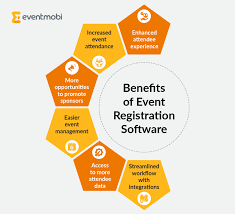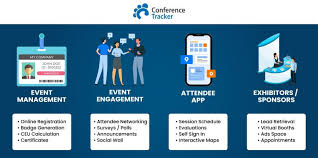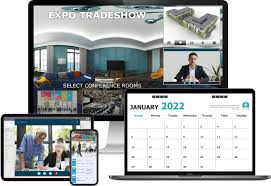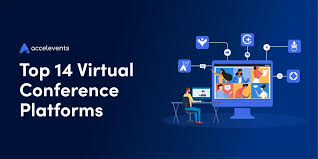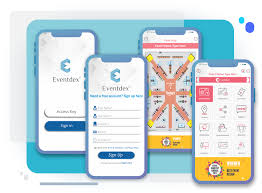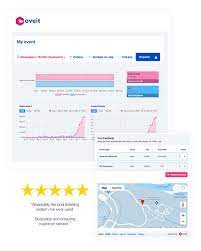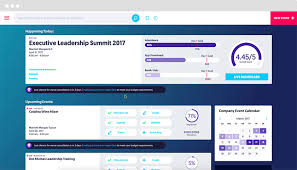The Benefits of Using Corporate Event Registration Software
Corporate event registration software has revolutionized the way companies plan and manage their events. Gone are the days of manual registration processes and endless paperwork. With the advent of event registration software, businesses can streamline the entire registration process, making it easier and more efficient for both organizers and attendees.
Benefits of using corporate event registration software include:
- Efficiency: Automating the registration process saves time and reduces the risk of errors associated with manual data entry.
- Customization: Event registration software allows companies to create customizable registration forms tailored to their specific event needs.
- Integration: Many event registration platforms offer integration with other tools such as CRM systems, email marketing software, and payment gateways for a seamless experience.
- Data Management: Easily collect, store, and access attendee data for reporting and analysis purposes.
- Communication: Send automated confirmations, reminders, and updates to attendees to keep them informed before, during, and after the event.
In conclusion, corporate event registration software offers a wide range of benefits that can enhance the planning and execution of events. By leveraging technology to streamline the registration process, companies can improve efficiency, increase attendee satisfaction, and ultimately achieve greater success with their corporate events.
9 Key Benefits of Using Corporate Event Registration Software: Streamlining and Enhancing Your Event Management
- Streamlines the registration process
- Reduces manual data entry errors
- Offers customizable registration forms
- Provides integration with other tools like CRM systems and email marketing software
- Facilitates easy data management for reporting and analysis
- Automates communication with attendees through confirmations and reminders
- Enhances attendee experience with online registration options
- Increases efficiency in event planning and management
- Improves overall organization and coordination of corporate events
Seven Drawbacks of Corporate Event Registration Software: Costs, Complexity, and Integration Challenges
- Costly subscription fees can be prohibitive for small businesses.
- Complex setup and customization may require technical expertise.
- Limited flexibility in terms of design and layout of registration forms.
- Potential for technical glitches or system downtime during peak registration periods.
- Data security concerns related to storing sensitive attendee information online.
- Difficulty in integrating with existing software systems used by the company.
- Lack of personalized customer support for troubleshooting issues.
Streamlines the registration process
Corporate event registration software offers the significant benefit of streamlining the registration process. By automating tasks such as form submission, data collection, and payment processing, this software eliminates manual efforts and reduces the likelihood of errors. Attendees can easily register online, saving time and effort for both organizers and participants. With streamlined registration processes, companies can efficiently manage attendee information, track registrations in real-time, and ensure a smooth and hassle-free experience for all involved in the event.
Reduces manual data entry errors
Corporate event registration software offers the significant advantage of reducing manual data entry errors. By automating the registration process, the software eliminates the need for manual input of attendee information, minimizing the risk of typos, inaccuracies, and missing data. This not only saves time but also ensures that all attendee information is captured accurately, leading to a more efficient and error-free registration process for both organizers and attendees.
Offers customizable registration forms
One key advantage of corporate event registration software is its ability to offer customizable registration forms. This feature allows businesses to tailor their registration process to meet their specific event needs and requirements. By creating personalized registration forms, companies can gather relevant information from attendees, such as dietary restrictions, session preferences, or special accommodations. This customization not only enhances the attendee experience but also provides organizers with valuable data to better plan and execute successful events.
Provides integration with other tools like CRM systems and email marketing software
One key advantage of corporate event registration software is its ability to seamlessly integrate with other essential tools such as CRM systems and email marketing software. This integration allows businesses to centralize their event data, streamline communication with attendees, and enhance marketing efforts. By syncing registration information with CRM systems, companies can better track attendee interactions and tailor their follow-up strategies. Additionally, integrating with email marketing software enables targeted messaging, personalized communication, and automated reminders to ensure a smooth and engaging experience for event participants.
Facilitates easy data management for reporting and analysis
Corporate event registration software streamlines the process of data management, making it effortless to collect, store, and access attendee information. This feature enables organizers to generate detailed reports and conduct thorough analysis, providing valuable insights into attendee demographics, preferences, and engagement levels. By simplifying data management tasks, event registration software empowers businesses to make informed decisions that enhance the overall success and effectiveness of their corporate events.
Automates communication with attendees through confirmations and reminders
One key advantage of corporate event registration software is its ability to automate communication with attendees through confirmations and reminders. By setting up automated messages, organizers can ensure that attendees receive timely information about the event, such as registration confirmations, agenda updates, and important reminders. This feature not only helps keep attendees informed but also saves organizers time and effort by eliminating the need for manual communication tasks. Automated messages can enhance attendee engagement and satisfaction, leading to a smoother and more successful event experience for all involved.
Enhances attendee experience with online registration options
By offering online registration options, corporate event registration software significantly enhances the attendee experience. Attendees can easily register for events at their convenience, eliminating the need for manual paperwork and long queues. This streamlined process provides a user-friendly experience, allowing attendees to register quickly and securely from any device with an internet connection. Additionally, online registration options offer flexibility and accessibility, empowering attendees to sign up for events hassle-free, ultimately improving their overall satisfaction and engagement with the event.
Increases efficiency in event planning and management
Corporate event registration software significantly boosts efficiency in event planning and management by automating tedious tasks and streamlining processes. With the ability to create customized registration forms, track attendee data, and integrate with other tools seamlessly, event organizers can save time and resources while ensuring a smooth and organized event experience for both themselves and attendees. This increased efficiency allows for better allocation of resources, improved communication with participants, and ultimately leads to more successful corporate events.
Improves overall organization and coordination of corporate events
Corporate event registration software significantly enhances the overall organization and coordination of corporate events by providing a centralized platform for managing registrations, attendee information, and event logistics. With features such as real-time data updates, automated notifications, and customizable reporting tools, event organizers can efficiently track attendee numbers, preferences, and engagement levels. This level of organization ensures smoother communication among team members, vendors, and attendees, leading to a more seamless and successful corporate event experience.
Costly subscription fees can be prohibitive for small businesses.
One significant drawback of corporate event registration software is the potentially high subscription fees, which can be prohibitive for small businesses with limited budgets. The cost of acquiring and maintaining such software can pose a financial challenge for smaller companies looking to streamline their event registration processes. This expense may deter some businesses from investing in event registration software, limiting their ability to take advantage of the efficiency and convenience it offers. As a result, small businesses may need to explore alternative solutions or carefully weigh the benefits against the costs before committing to using corporate event registration software.
Complex setup and customization may require technical expertise.
A significant drawback of corporate event registration software is that complex setup and customization may necessitate technical expertise. Companies without dedicated IT support or individuals unfamiliar with software configuration may find it challenging to fully utilize the advanced features of event registration platforms. This can lead to delays in implementation, increased reliance on external support, and potential errors in the setup process. The need for technical proficiency can hinder the seamless integration of the software into existing event management workflows, posing a barrier to maximizing the software’s full potential for efficient event planning and execution.
Limited flexibility in terms of design and layout of registration forms.
One significant drawback of corporate event registration software is the limited flexibility in terms of design and layout of registration forms. While these software solutions offer convenience and efficiency in managing registrations, they often come with pre-set templates that may not fully align with the branding or specific requirements of an event. This limitation can hinder the ability to create a unique and personalized registration experience for attendees, potentially impacting the overall impression and effectiveness of the event registration process. Organizers may find themselves constrained by the rigid design options available within the software, limiting their creativity and customization capabilities for capturing attendee information effectively.
Potential for technical glitches or system downtime during peak registration periods.
One significant drawback of corporate event registration software is the potential for technical glitches or system downtime during peak registration periods. This can lead to frustration among both organizers and attendees, as delays in the registration process may result in missed opportunities or decreased participation. Ensuring a reliable and robust system infrastructure, along with contingency plans in place to address any technical issues promptly, is crucial to mitigate this con and maintain a smooth registration experience for all stakeholders involved.
Data security concerns related to storing sensitive attendee information online.
One significant con of corporate event registration software is the data security concerns associated with storing sensitive attendee information online. With the increasing threat of data breaches and cyber attacks, companies must carefully consider the risks involved in storing personal and confidential data on digital platforms. The potential for unauthorized access to attendee information, such as names, contact details, and payment details, raises valid concerns about privacy and data protection compliance. Organizations using event registration software must implement robust security measures to safeguard sensitive data and mitigate the risk of breaches that could compromise attendee trust and damage their reputation.
Difficulty in integrating with existing software systems used by the company.
One notable challenge of corporate event registration software is the difficulty in integrating with existing software systems used by the company. This can lead to compatibility issues, data transfer complications, and additional time and resources needed to ensure seamless integration. Companies may face obstacles in syncing their event registration software with their CRM systems, email marketing platforms, or other internal tools, which can disrupt workflow efficiency and hinder the overall effectiveness of event planning and management processes. Addressing these integration challenges requires careful consideration and possibly custom solutions to ensure a cohesive and interconnected system across all software applications utilized by the company.
Lack of personalized customer support for troubleshooting issues.
One significant drawback of corporate event registration software is the potential lack of personalized customer support for troubleshooting issues. While these platforms offer automated solutions for registration processes, users may encounter challenges or technical difficulties that require immediate assistance. Without personalized customer support, users may struggle to resolve issues efficiently, leading to delays or disruptions in event planning and management. This limitation underscores the importance of considering the level of customer support provided by event registration software providers to ensure a smooth and successful event experience for all stakeholders involved.

